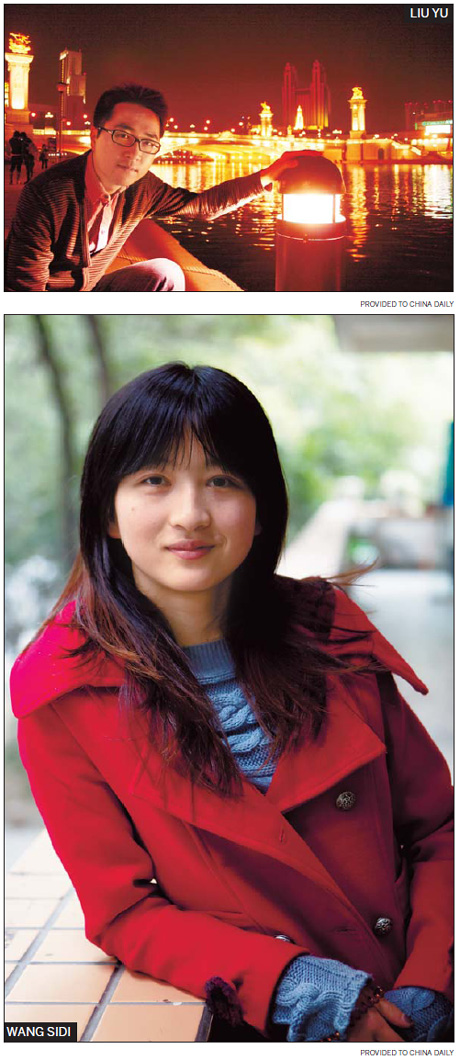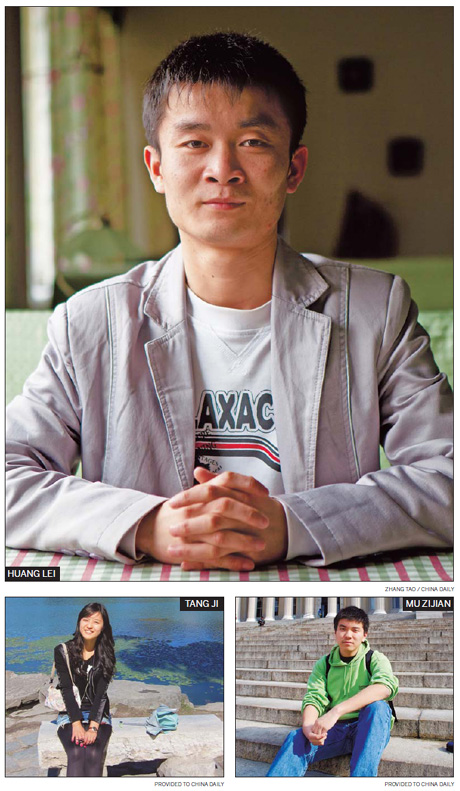Top News
SUNY days for students from quake-hit regions
Updated: 2011-05-03 07:55
By Gao Qihui in Sichuan and Zhang Yuwei in New York (China Daily)
US university program reaches out to survivors, report Gao Qihui in Sichuan and Zhang Yuwei in New York.
The 8.0-magnitude earthquake that struck Southwest China's Sichuan province on May 12, 2008, destroyed tens of thousands of lives, but following the catastrophe a program by the State University of New York (SUNY) provided a unique opportunity for 150 university students.
They were the beneficiaries of an offer by SUNY that June to study at 22 of its campuses for two semesters without charge. Three months after the quake, on Aug 15, the students flew from Chengdu to New York.
The China Scholarship Council-SUNY China 150 program selected participants after reviewing the academic performance and English language proficiency of more than 2,000 applicants. All were from quake-hit areas and were studying in Sichuan.
Nearly three years later, China Daily talked with five of the students. How, they were asked, had this year abroad affected them?
The warmth of their treatment by teachers, students and others had led to some chemical reactions in their hearts. They had been converted from being mere recipients of help to young adults who keep the importance of giving in mind, from followers of others' wishes to decision-makers about their own futures.
Should I go?
The initial stage of the program proceeded so quickly - the 150 were chosen in just two weeks - that it broke into their thoughts about the losses wrought by the earthquake and on reconstruction.
It left Wang Sidi, a student at Southwest Jiaotong University, feeling quite "weird and unprepared". Her father and five other close relatives had died in the earthquake.
Wang, who was 18, hesitated to go when she was selected, because it would mean leaving her widowed mother alone at home. But Wang also felt driven to escape the familiar reminders of her loss.
When Huang Lei, a student at Chengdu University of Information and Technology, received a phone call telling him he was a candidate, he was on a bus heading home, to Wugui village of Dujiangyan city. His family was living in a tent, although the quake had only minimally cracked a couple of walls in their home, so Huang, then 20, also hesitated to accept the opportunity.
Some of the 150 students, those who were only slightly affected by the earthquake, were downright excited about the program.
"In southwestern China, there are few chances for students to be sponsored to study abroad," said Tang Ji, then a student of Southwest University of Finance and Economics. "I felt it was unbelievable and my classmates were all excited."
Less than two months after hearing about the program, these young students were already in New York. It was so fast that Tang, now 23, who studied at SUNY's Cobleskill campus, felt like she was in another world.
Mu Zijian, a Qiang ethnic student at Sichuan University, described his first feeling as unreal. "We were suddenly in the center of the world from a remote area."
Even Wang, whose father had died in the quake, felt like jumping into the United States.
A soft landing
Born and studying in Sichuan province, where the sky is enveloped in fog most of time, these students were intoxicated by the warm sunshine of New York. Even warmer, they said, were the hospitality and care of the SUNY faculty and local people, including overseas Chinese.
A week after the 150 arrived in New York, a local Chinese mobile phone service provider gave each student a SIM card for the mobile phone and pre-charged money for them.
Liu Yu, 23, of Sichuan University said SUNY's considerate preparation helped the Chinese students accomplish a soft landing. "They assigned a psychological counselor for each campus to observe our mental state and help us," Liu said. "They organized a lot of activities for us to distract our attention, and took very good care of us."
Mu, 22, repeatedly mentioned Jim Jailer, an economics professor who also taught him American culture and history. "Each weekend, Jim took us off the campus for activities and treated us as his own children."
But Jailer, 62, said, "It is my obligation because these people are guests of my country." His behavior "had nothing to do with their special background", Jailer said. In his eyes, these students were just unpretentious and sincere kids.
Wang was touched by the actions of her roommate, an American.
On May 12, 2009, the first anniversary of the Wenchuan earthquake, Wang could not help missing her father and she left the dormitory alone for a walk around 2 am. Her roommate took several friends to light candles with Wang and stayed with her, hand in hand.
"I did not feel they treated me like this because I was very miserable," Wang said. "They just wanted to be good to me."
Gratitude for luck
These 150 students successfully completed their studies in New York and returned to Sichuan on May 25, 2009. They brought with them the goodwill they had been shown.
"Actually, I am the beneficiary of this earthquake and I cannot deny that," Tang said, "but we can bring this benefit back and pass it to others."
Tang vowed to help others, and she has decided to fund a university student in the future. "I will feel happier giving something to someone else than making personal achievements."
"Thanks" is the word Liu used most frequently. "I really cherish such an opportunity and am grateful for what I received." He feels he was lucky, and also believes such luck needs to be passed along.
Anthony DeBlasi, a professor of East Asian studies at SUNY's University of Albany, was impressed by the students' attitude under difficult circumstances. "All appreciated the opportunity that they could come and study here," he said. "They worked very hard."
Reviewing this nine-month experience, Huang said that he picked up academic knowledge, but his bigger "harvest" was learning how to help others and be independent.
A new view of life
After returning, the five students started to re-examine their perspectives on life.
Mu determined that pursuing what you want is a precondition for a happy life. He realized he did not like his college major, international trade, although it is a highly regarded course of study. So in his spare time, he began to focus on a field that interests him, news and documentary. He has received offers from several overseas universities to study journalism as a postgraduate.
Wang is not sure what she wants to do in the future, but said she has reflected on her life that, until now, was designed primarily by her parents. She said she liked studying in the United States and enjoys the culture. She has applied to two US universities to study marketing although she is hesitating again, because her mother remains alone.
Huang Lei, who is a senior student, prefers to apply theory to practice, so he decided to skip the national graduate school entrance examination. He already has been offered a job by Alibaba Group Holding Ltd, China's largest e-commerce company.
Liu is now a graduate student at the Chinese Academy of Sciences and strongly believes he is on the right track toward a career as an Internet engineer.
Tang has turned her attention to disadvantaged people. She is a graduate student in finance in the Guanghua School of Management at Peking University, one of China's top schools. However, she said, "I am more magnanimous and I can fulfill my value in fields other than my major."
Tang intends to step into the cause of education if she has the chance. "I look forward to making some contributions to the education of Sichuan province."
Tang also has determined to return to Sichuan after graduation, rather than go to Beijing or Shanghai, which are considered the best places for finance graduates from prestigious schools.
Giving back
As the students pursue their dreams, some of them new, they also are under pressure. They know that they spent nine months studying in the US, at no cost, because of an earthquake that killed at least 69,227 people.
As Liu put it, "This opportunity is at the cost of so many people's lives."
Consequently, it is widely expected that they should devote themselves to reconstruction or to helping the local people in the post-quake development. The students, however, have their own understanding of giving back and believe it should not have the limit of time and place.
"We can do nothing right now and it is impractical for us to make promises to others and tell them what and when we will come back to do what kind of contribution," Tang said. "But we have been thinking about that all the time."
Mu, who is going abroad again to study, regards his departure as a route to a better return. Even if he becomes a reporter one day, he said, he will cover the stories of his hometown.
Huang said you can help others only if you have built yourself up.
They are not completely putting off of giving back, however. When the 150 students finished their US studies, they received donations from local Chinese, and they pooled the gifts and started a charitable fund.
They donated $3,000 to Japan after the 9.0-magnitude earthquake there on March 11. The fund also gave $2,450 to Humeng Central Primary School in Yingjiang county, Yunnan province, site of a 5.8-magnitude earthquake on March 10.


(China Daily 05/03/2011 page1)
Specials

British Royal Wedding
Prince William and Kate Middleton married at Westminster Abbey in a royal occasion of dazzling pomp and pageantry.
Best wishes

The final frontier
Xinjiang is a mysterious land of extremes that never falls to fascinate.

Bridging the gap
Tsinghua University attracts a cohort of foreign students wanting to come to China.